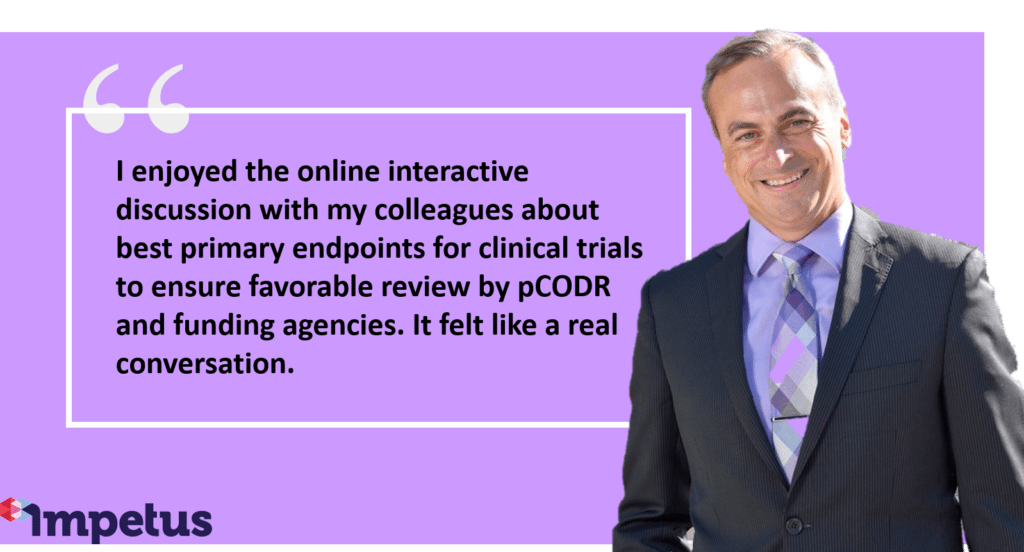Impetus Digital’s market access virtual advisory board consists of 7 of the top ex-payers in Canada who are subject matter experts in pricing and market access submission processes. Our goal is to provide market access, reimbursement, pricing, and health economics managers within Canadian pharma companies quick and economical access to key insights that will help to drive brand agendas forward.
There are many ways to work with Impetus. Companies can sponsor a single virtual advisory board touchpoint assignment or multiple touchpoints, depending on how many brands, topics, or issues a company may have to resolve.
For each online touchpoint assignment, companies can ask up to 10 questions via InSite Exchange™ or leverage InSite Annotator™ to have the advisors annotate or provide granular comments to dossier submissions or rebuttals. The advisors will be able to post their responses asynchronously and all advisors will be able to read and reply to each other’s comments. In addition, you will be able to seek further clarification by replying to an advisor’s comments in the discussion forum and they will receive an email notification that you have replied online to their comment.
Your online “project” can be branded with your company logo and colors and you will “own” the data results from the discussion through the provision of a Summary Report that will consist of an Executive Summary and Recommendations, along with the transcript of the questions and comments.
 Our Market Access Virtual Advisory Board can be used to answer the following questions:
Our Market Access Virtual Advisory Board can be used to answer the following questions:
- Key considerations for your company to be mindful of when preparing for your brand’s pre-clinical and clinical studies, special access programs, notice of compliance, or PMPRB, CDR, pCODR or INESS submission and reimbursement negotiations with the pCPA and governmental and private insurers.
- What do payers think about real-world data and what do they suggest you do to improve the data you share in this area?
- What do payers think about paying for performance or risk sharing programs and what will this potentially look like in the future?
- What do payers think about the current value-added services provided by pharmaceutical companies? How useful are they?
- What is the future of DTC consumer advertising and how will this help or hinder future drug reimbursement?
- What suggestions do payers have about the collection and distribution of HEOR data and how can pharma leverage these insights to better position their brands?
- What payer opinions should pharma be aware of when designing new value-added service offerings?
- Which therapy areas have the most need for value-added service offerings? How can pharma better meet payer needs in these core areas?
- How do value-added services positively or negatively influence payer decisions?
- What do payers say they don’t want? What concerns do payers have regarding certain kinds of value-added services?
- Understand how business models must be adapted for specialty, branded, me-too, generic, and biosimilar products.

 The results are:
The results are:
- 40% increase in speed to insight gathering and project completions
- 50% increase in quantity and quality of insights gathered
- 75% decrease in costs versus in-person consultancy meetings
- 90% customer engagement rates, a 30% increase versus in-person consultancy meetings
- Reduced costs in customer recruitment and reduced time and hassle associated with internal advisory board paperwork and service agreements



